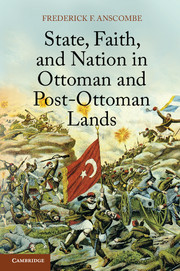Book contents
- Frontmatter
- Dedication
- Contents
- List of Maps and Images
- Acknowledgments
- Transliteration and Abbreviations
- Maps
- Introduction
- Part I The Ottoman Empire
- Part II From Ottoman to Post-Ottoman States
- 6 The Post-Ottoman Balkans
- 7 Post-Ottoman Turkey
- 8 The Post-Ottoman Arab Lands
- Part III Contemporary Post-Ottoman States
- Conclusion State, Faith, and Nation
- Bibliography
- Index
- References
6 - The Post-Ottoman Balkans
Published online by Cambridge University Press: 05 June 2014
- Frontmatter
- Dedication
- Contents
- List of Maps and Images
- Acknowledgments
- Transliteration and Abbreviations
- Maps
- Introduction
- Part I The Ottoman Empire
- Part II From Ottoman to Post-Ottoman States
- 6 The Post-Ottoman Balkans
- 7 Post-Ottoman Turkey
- 8 The Post-Ottoman Arab Lands
- Part III Contemporary Post-Ottoman States
- Conclusion State, Faith, and Nation
- Bibliography
- Index
- References
Summary
With Yugoslavia’s bloody disintegration in the 1990s, the Balkans have come to be associated in the Western public mind with the worst excesses of nationalism in past and present. This perception, which is hardly fair in light of much of the rest of Europe’s appalling record in this regard from the late nineteenth to mid-twentieth centuries, results in part from widespread ignorance of the region and its history but also in part from the preponderance of national identity in shaping the published accounts of the area’s development that do exist. Those that speak of Greeks, Serbs, Bulgarians, or Romanians as distinct collectives in the Ottoman or earlier eras gloss over the vagueness of such ethnic identities prior to the creation of post-Ottoman states that undertook zealous nation building.
Under Ottoman rule, Orthodox Christians lived in an anational ecumene that reached across the peninsula. Christianity in the Balkans was organized according to the combined interests of the Ottoman state and the state-sanctioned church hierarchy, neither of which had any reason to “preserve” or promote ethnic identity. The languages that helped to create the ecumene, liturgical Greek and Slavonic, could be spoken by the educated but were not mother tongues for anyone, a situation with some parallel elsewhere in Europe in the Catholic Church’s use of Latin. As in the tenacity of Catholicism’s linkage to Latin (relinquished as the sole language of the liturgy only in the 1960s but still used in church services, documents such as Papal encyclicals, and even a Vatican Web site), the religious rather than ethnic character of the languages written by the literate was clear – and indeed dangerous to question, as shown by the collapse of the Greek government in 1901 following “Gospel riots” over plans to translate scripture into the vernacular. Since liturgical Greek and Slavonic were learned languages, there was no insuperable ethnic bar to entry into the church hierarchy.
- Type
- Chapter
- Information
- State, Faith, and Nation in Ottoman and Post-Ottoman Lands , pp. 149 - 180Publisher: Cambridge University PressPrint publication year: 2014



